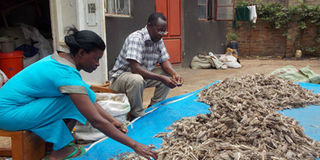Turning value addition into family business

Right, the Musokes sort okra grain before processing it into okra powder. PHOTO BY MICHAEL J.SSALI
What you need to know:
Farmers need some basic skills of food processing and preservation. In most cases, the farmers that try to process their food items end up selling them at better prices and earning higher profits
When farmers harvest a crop like bananas they usually sell it off quickly or to consume it before it gets spoiled due to its short shelve life.
Fresh vegetables, bananas, cassava, potatoes, milk, meat, and groundnuts are some of the food items produced by farmers in this country. However, since they are rather perishable, it is a challenge for the farmers to keep them long enough before they deteriorate.
More marketable

Bigirwa puts labels on the juice bottles. PHOTO BY MICHAEL J.SSALI
Many farmers, therefore, sell their farm produce at low prices and end up making little or no profit.
Farmers need some basic skills of food processing and preservation. In most cases, the farmers that try to process their food items end up selling them at better prices and earning higher profits.
Food processing is basically about improving the storage life, quality and safety. Thus, the farmer may make it more marketable.
Samuel Musoke, chairman of Uganda Small-Scale Industries Association (USSIA) in Masaka sub-region, and his wife Sarah, are ennjoying the advantages of food processing.
They grow okra on their farm, which they process into powder. This fetches them more money than they would from okra grain.
“We find value addition to our farm products exciting as we keep getting new customers,” said Musoke.
They are now looking for outgrowers for okra to keep pace with the demand for the powder. It is consumed as a beverage in their neighbourhood, competing fairly well with coffee and tea.
Sarah, who is a trained nurse, pointed out the micro-nutrients as iron, magnesium, zinc, phosphorous, calcium, fibres and ash.
“The beverage is caffeine-free and it rejuvenates the body,” she said.
Working from their home, the family also adds value to other food crops, which they buy from farmers.
They produce packed millet flour, soya flour, millet/soya flour, roasted simsim, peanut butter, cassava with millet (kalo) flour, groundnut sauce, groundnut with simsim (roasted), natural honey, and liquid soap.
Make and brand
All the products meet the Uganda National Bureau of Standards (UNBS) requirements.
“We purchase honey from as far as Arua District in northern Uganda and we process it before packaging it,” Ms Musoke said.
“When we set out to add value to the food products the idea was not to make money,” she said. “I only meant to get nutritive food for our young children. I wanted them to have protein in their diet and I thought of groundnuts, simsim, millet, and soya.”
With time, her neighbours came to know about her products and they began to ask for her to supply them.
She narrates: “What matters most in this kind of work is cleanliness. When my neighbours tasted the porridge I made, they realised it was much better because it had no sand or soil in it. They kept asking for more.
Today, we have turned value addition into a family business. We make and brand our products here and then take them to an outlet in Masaka Town.
For much of 2015, we have been showcasing our products in various agricultural shows. This has helped us to get more customers.”
Once in a while her husband, Samuel, who has a Bachelor’s degree in accounting and a Master’s in Business Administration, is engaged in training farmers and youth interested in small-scale agro-processing. They make potato and banana crisps, and bagia out of cassava as well as bake cakes.
It has been discovered that now farmers can make flour out of bio-fortified sweet potato and make cakes or chapattis.
Inspired others
Musoke’s friend, David Birungi Rugira, is engaged in making pineapple juice.
A former bank employee, he formed a partnership with four others to form a company, which turns out 100 dozen pineapple juice bottles a day.
“What we do is to buy the pineapples from the farmers, wash them, peel them, cut them into small pieces, extract the juice, boil the juice, add preservatives, put it into the cooling tank, bottle it, seal the bottles in dozens, and then take them to the markets to sell,” he said.
They too have UNBS certification for their products.




